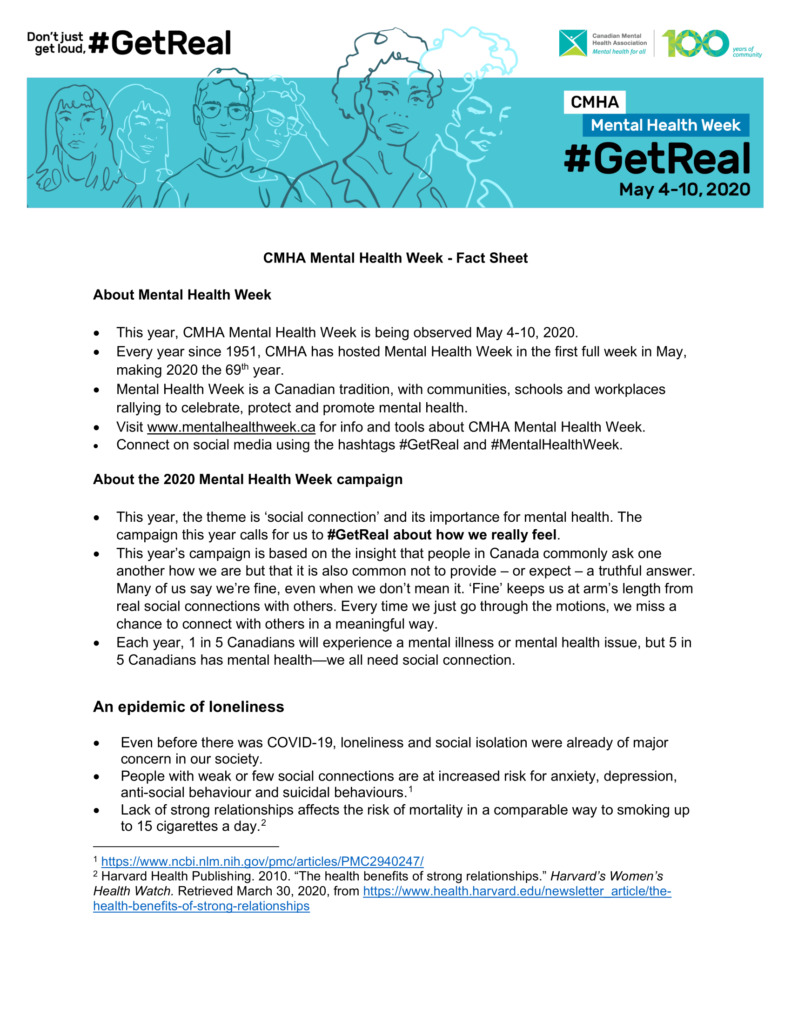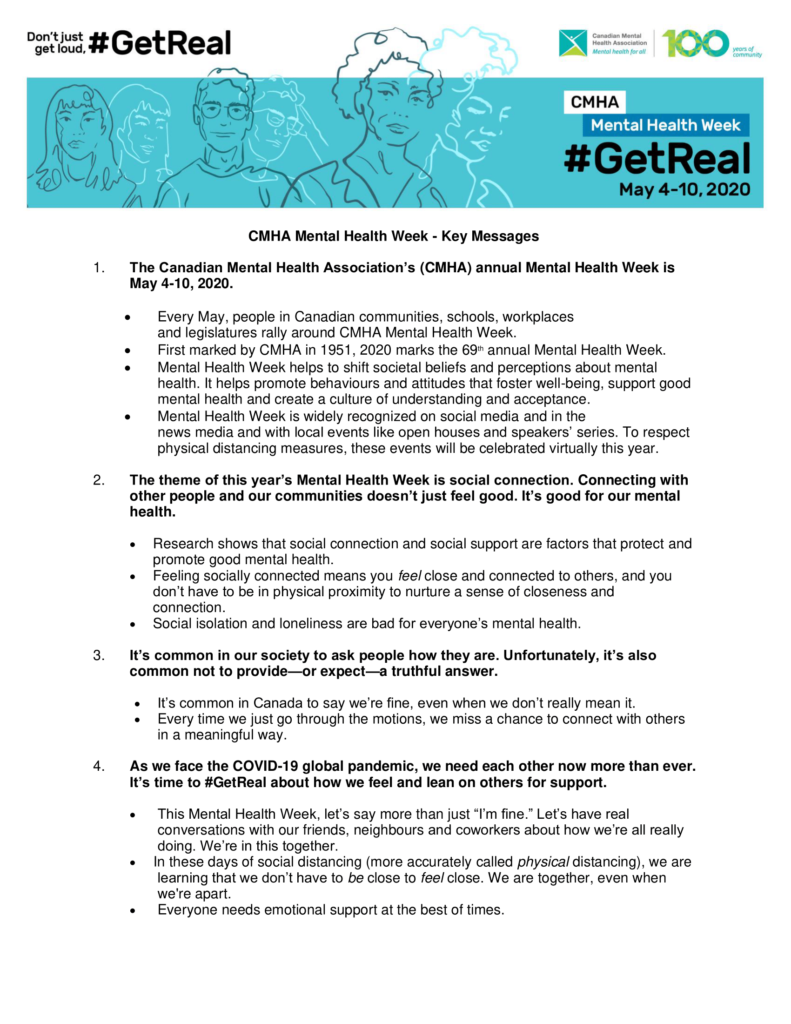Cannabis, COVID-19, and Mental Health Week

Supporting Mental Health Week During a Pandemic, and How Cannabis Can Help
May 4th to May 10th marks the Canadian Mental Health Association’s (CMHA) 69th annual mental health week. This week is dedicated to talking about mental health, raising awareness, and exploring different ways to manage and address mental health concerns.
COVID-19 brings a new meaning to mental health week in Canada. The pandemic presents a uniquely stressful time for individuals and communities, and now, many have a new perspective on the concept of mental health. What’s important to understand is that it’s completely normal, expected even, to feel stress, anxiety, and loneliness during a time of crisis. Whether you’ve been laid off, are missing your loved ones, or are generally feeling anxiety about the virus itself, it’s okay to not be okay.
Mental Health and COVID-19
Physical isolation and social distancing are currently two of the most common stressors. These stressors are also putting more strain on the mental health of individuals across the globe.
While we must practise social distancing, now more than ever is a time to come together as a community and support one another. This week, take time to get in touch with people around you, reach out if you need support, and acknowledge your own mental health.
“The social support that (people) often rely on can be removed from their day to day life. It’s important that we continue to find ways to continue to support one another and help each other have our basic needs met,” says Jacqui Williams, Executive Director of the CMHA Swift Current branch.

It’s no surprise, then, that this year’s mental health week theme is #GetReal. Even if we’re not predisposed to mental health issues, it’s an opportunity to be upfront about our stressors and anxiety during the pandemic and to be honest about our mental health. Think about a time when you or someone you know says, “I’m fine,” but might not mean it. This week brings forth an approach to #GetReal and face mental health in a positive, constructive way together.
“Everyone will struggle under this to some degree,” Williams continues. “So we need to care about one another enough to help each other out and to provide the support you know over the phone, across your fence to your neighbour, and to look out for one another.”
Read More: Your Social Distancing Survival Guide
Cannabis Use for Mental Health
A popular treatment for anxiety, depression, and other mental health issues is CBD. CBD is a naturally-occurring chemical compound (also known as a cannabinoid) that is sourced from flowers and leaves from cannabis plants like marijuana and hemp. Unlike THC, CBD is not psychoactive, therefore it will not get you high regardless of your dosage.
CBD oil relieves common symptoms from mental and physical health issues. Depression, anxiety, acne, cancer symptoms, heart disease, and chronic or acute pain, are among the many conditions that can be eased by the recreational use of CBD.
Read More: CBD Oil FAQs
Peter Grinspoon, M.D., a contributor to Harvard Medical School explains that “CBD-dominant strains have little or no THC, so patients report very little if any alteration in consciousness. Patients do, however, report many benefits of CBD, from relieving insomnia, anxiety, spasticity, and pain to treating potentially life-threatening conditions such as epilepsy. One particular form of childhood epilepsy called Dravet syndrome is almost impossible to control but responds dramatically to a CBD-dominant strain of marijuana called Charlotte’s Web.”
Read More: Cannabis and Mental Health
How Medical Marijuana Benefits Mental Health
(and other benefits)
- Manage anxiety
- Relieve insomnia
- Relieve spasticity
- Reduce cognitive impairment
- Pain management due to treatment from life-threatening conditions such as epilepsy, cancer, and AIDS
- Reduce inflammation
- Control nausea
- Kill cancer cells and slow tumour growth
- Relax tight muscles in people with MS
- Stimulate appetite and improve weight gain in people with cancer and AIDS
8 Tips for Improving Mental Health
Maintaining your mental health isn’t always an easy process, but just know that it’s okay to not be okay all the time. In fact, recognizing it and facing it head-on is always going to do you better than ignoring it or trying to suppress uncomfortable feelings.
There are many helpful resources and tools at your disposal that are designed to help you live your best life.
Things you can do to make a difference today:
1. Stay connected
Keeping in touch with loved ones and close friends is incredibly important under normal circumstances. It’s even more crucial during a global pandemic that’s forced us all in our homes. Don’t feel like divulging details or getting into anything too personal? That’s totally okay! Go at your own pace and keep your circle close. It’s also worth mentioning that maybe some of your family members, friends, or coworkers are going through similar emotions, so make a note of checking in on those around you as well.

2. Get outside
It’s no surprise that a dose of vitamin D can improve your mood. Getting outside, especially as the warmer weather approaches, can do wonders for your mental health. Even if it’s just a stroll around the block or to a nearby park to walk your dog, dedicate some time to yourself to be outside. Be sure to check your local COVID-19 social distancing rules when it comes to communal outdoor spaces before heading out.
“Various studies confirm the link between low vitamin D and mental illness. These studies provide evidence that optimizing vitamin D levels may improve positive psychological well-being,” states James M. Greenblatt, M.D. in Psychology Today.
3. Exercise
Exercising releases endorphins that are natural mood enhancers. Whether that’s a run, long walk, or you’re fortunate enough to have an at-home gym, there’s plenty of ways to get active. Since the local gyms are temporarily closed, you may have to get crafty when it comes to at-home workouts. Remember, start small and get online – there are a ton of amazing workout plans and training modules that are absolutely free.

4. Eat well
We don’t mean pop open your favourite bag of candy when the munchies hit. Eating a balanced diet is tied to optimal physical and mental health. Constantly putting junk in your body may feel like you’re satisfying a craving at the moment, but this is a temporary state of euphoria which can leave you worse off. What your body really wants is the proper quantity of nutrients, vitamins and minerals to operate efficiently. That’s not to say you shouldn’t treat yourself – just remember, a balanced meal equals a balanced mind.
5. Sleep
Whoever says sleep is overrated is lying. Getting enough sleep is probably the most important thing a person can do to improve their mental health. The Canadian Mental Health Association highlights how sleep or lack thereof can have a negative impact on your mood, your body, the way you think and can even influence your behaviours. Think about your body as if it were a car – driving on fumes is harmful to the engine and overall vehicle performance.
According to the Government of Canada, 12.3% of adults who get insufficient sleep report having poor mental health compared to 5.8% of adults who get adequate sleep.

6. Animal therapy
There’s something about unconditional love that warms the heart and soul in a unique way. Therapy animals have been integrated into mental health research and treatment since the 1960s. Remember, pets are for life. If you don’t feel that you can look after one for the foreseeable future, fostering is probably the best option for you.
According to the Anxiety and Depression Association of America, “specifically, pets and therapy animals can help alleviate stress, anxiety, depression, and feelings of loneliness and social isolation. Interactions with animals can help people manage their long-term mental health conditions.”

7. Take up a hobby
Whether you’re working or not, taking up a hobby in something that interests you is a great way to distract yourself from the day-to-day pressures of COVID, work, and other responsibilities. Now is a great time to invest in yourself and get involved in a new hobby or picking one up again.
Some great options include:
- Learning an instrument
- Art
- Writing
- Photography
- Video making
- Crafts
- Home projects
- Learning a language
- Cooking
- Gaming

8. Reach out for Help
You’re not in this alone. Contact a professional to get the help you need to maintain your mental health. Scroll to the bottom of the page for federal and provincial resources. CMHA has also compiled some great resources and tips to help support your mental health during this time of uncertainty.
Federal and Provincial Resources in Canada
- The Centre for Addiction and Mental Health (CAMH) offers a range of FAQs, self-assessment tools, and tip sheets here.
- The Canadian Mental Health Association (CMHA) offers some tips to stay mentally well through these difficult times.
- Canada’s National Defence department with helpful tips on mental health.
- World Health Organization (WHO) offers various coping mechanisms when dealing with stress during COVID-19.
- WHO on helping children cope with stress throughout COVID-19
- List of Canadian Crisis Centre Numbers – National and Provincial
- Mental Health Commission of Canada: Tips for those with anxiety surrounding COVID-19
- Mood Disorders Society of Canada
BRITISH COLUMBIA:
ALBERTA:
ONTARIO:
QUEBEC:
NEW BRUNSWICK:
SASKATCHEWAN:
MANITOBA:
- Government of Manitoba – Mental health and addictions
- Free online counselling program launched by the Manitoba government
NOVA SCOTIA:
PRINCE EDWARD ISLAND:
NEWFOUNDLAND AND LABRADOR:
NORTHWEST TERRITORIES:
YUKON:
NUNAVUT:
Blunt
As we continue to see the cannabis industry unfold and take flight before us, we strive to become the leading global provider of real-time, high-impact multimedia news, information, and entertainment. With our vast network of millions of users, including major influencers in the cannabis industry, we continue to deliver relevant, quality content to help educate and inform.





